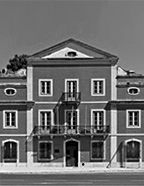

................................
Historiography
I
The importance of documents was also visible in the funds invested in their publication. In the first ten years of the Academy, when the budget still allowed for a reasonably extensive publication plan, the APH spent around 2.5 million escudos, most of which on the publication of sources. At Academy meetings, several of the works presented were focused on specific documents or archives, for example, the "Revelação do Verdadeiro Significado dos Sinais Ocultos nas Moedas Portuguesas" ["Revelation of the True Meaning of the Hidden Signs on Portuguese Coins,"] an oral presentation delivered by Pedro Batalha Reis, and those of Sampaio Ribeiro on the royal music library of King John IV (APH, Bulletin 1945, 100-101; APH, Bulletin 1946, 118-119).
The virtues of patience and diligence also went hand in hand with the concern for documents. The size of the document collections mattered, as seen in the Annual Report of 1945: "To assess the extent of the work undertaken, suffice to say that around six thousand medieval documents were inventoried, a report was prepared that would fill a volume of the 'Annals,' and in response to a request for clarification from an academic regarding former measures of distance, another academic had to reply with a study of seventy pages or so" (APH, Bulletin 1945, 121). Both patience and diligence were closely linked to the concern with documents insofar as they were essential virtues for a scrupulous analysis of their content.
On the other hand, the activity of the Academy was not exclusively tied to epistemic virtues. A nationalist political aspect was also at play. When considering the Academy's main interests in its publications, one encounters the "Foundation of Nationality," the restoration of independence, and Portuguese maritime history, particularly as regards exploration, discovery, and colonisation. Not only did all the works address national history, but patriotism was also deemed an important scholarly virtue. This involved an active nurturing of the Nation, through research and the dissemination of periods in Portugal's history that would evoke greater pride in the national body, as well as through the preservation and continuity of its traditions. This effort is clearly visible in various presentations in the Academy's plenary session, such as in Eduardo Lupi's presentation, "Campaign against Gungunhana – First fifty years," which was welcomed precisely as "his work addresses a brilliant period of our contemporary history, from a warrior's point of view," (APH, Bulletin 1945, 129-130). A patriotic perspective of this period acquired greater importance as the 19th century was generally seen in the context of the anti-liberal current as a period of decadence, of "anarchy established by the victory of liberalism" (Maurício, Invenção [Invention], 2005, 210).
